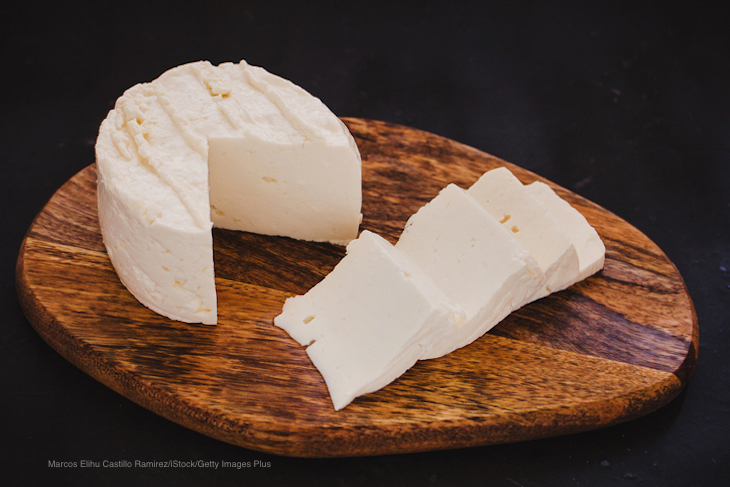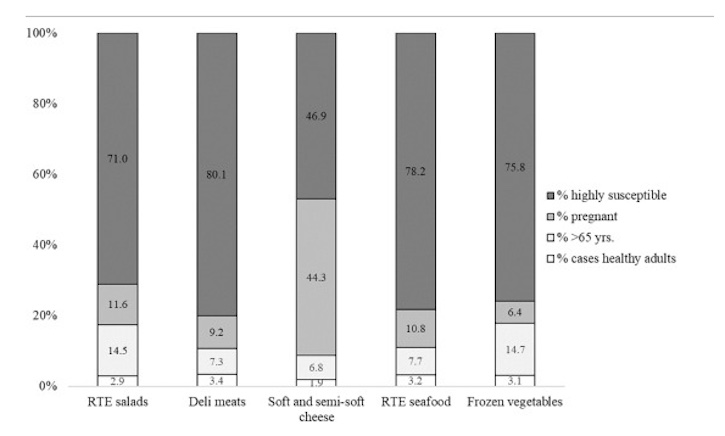Soft cheeses are the top Listeria threat for pregnant women in the U.S., according to a new study published in the International Journal of Food Microbiology. Pregnant women are among those at the highest risk of contracting Listeria infections. By studying which foods affected people at increased risk of contracting listeriosis, researchers from universities in the U.S. and Spain concluded that a targeted risk management approach could be effective in reducing the overall number of cases reported each year in the U.S.

In addition to pregnant women, those at increased risk for Listeria infection include people over 65, and “highly susceptible people” who have underlying diseases such as cancer, diabetes, HIV, or inflammatory diseases such as Crohn’s disease, Lupus, and rheumatoid arthritis. Together, this group accounts for about 20 to 30 percent of the total population but 96 to 98 percent of total Listeria cases.
Researchers examined the five foods most commonly linked to Listeria illnesses from 2015 to 2020 and broke down which high-risk group was most affected by each food. The five foods were ready-to-eat (RTE) salads, deli meats, soft cheeses, RTE seafood (such as smoked salmon), and frozen vegetables. Across all five food categories, most cases were attributed to the “highly susceptible” group, followed by pregnant women in three categories – deli meats, soft cheeses, and RTE seafood.
By food group, cases attributed to pregnant women were:
- Frozen vegetables, 6.4 percent
- Deli meat, 9.2 percent
- RTE seafood, 10.8 percent
- RTE salads, 11.6 percent
- Soft cheeses, 44.3 percent

Listeria thrives in Cold Environments
One thing that all five of the food categories have in common, is these foods are produced and stored in cold environments. Listeria monocytogenes bacteria like the cold and the damp. And the high moisture/low salt/low acidity content of soft cheese provides good conditions for the pathogen’s growth.
Recent Cheese Listeria Outbreaks
El Abuelito Queso Fresco
A 2021 Listeria outbreak linked to El Abuelito cheese highlighted the risk that queso fresco poses for pregnant women. Thirteen people were sickened in that outbreak. Twelve people were hospitalized, one person died. Two of the illnesses were pregnancy-associated and included a newborn and a pregnant woman who were unrelated.
During an inspection one year before the outbreak, FDA inspectors found nonpathogenic Listeria at El Abuelito‘s Paterson, NJ manufacturing plant. This type of finding is an indicator that conditions for the growth of Listeria monocytogenes may be present. Ina warning a warning letter to the company the FDA noted its lack of testing, hazard analysis, preventative controls, and food safety plan.
Old Europe Brie and Camembert
An ongoing Listeria outbreak linked to brie and camembert cheeses sold under a variety of brand names has sickened six people between August 2017 and August 2022. Genetic tests show that an environmental sample collected from the company’s Benton Harbor, MI manufacturing facility matches the outbreaks strain.
The cheese recall includes brie and camembert cheeses sold at grocery stores nationwide including: ACME, Albertsons, Andronico’s, Balducci’s, Eagle, Fresh Thyme, Foods, Giant Foods, Harding’s, Hannaford, Hy-Vee, Jewel-Osco, King’s, Lidl, Market 32, Market Basket, Martin’s, Meijer, Pak N Save, Pavillions, Price Chopper, Raley’s, Safeway, Save Mart, Shaw’s Stop & Shop, Sprouts, Target Trader Joe’s, Whole Foods and Winn Dixie.
Contact the Pritzker Hageman Lawyers Today
Phone: 1-888-377-8900 | Text: 612-261-0856
The consultation is free and you never pay anything until we win for you.